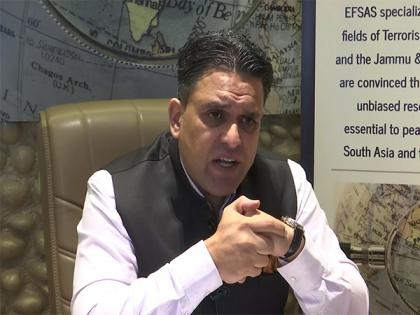Pakistan Army chief's nuclear threat 'stupid and irresponsible,' says EFSAS Director Junaid Qureshi
By ANI | Updated: August 12, 2025 19:10 IST2025-08-12T19:04:37+5:302025-08-12T19:10:00+5:30
Srinagar (Jammu and Kashmir) [India] August 12 : Kashmiri political activist and Director of the European Foundation for South ...

Pakistan Army chief's nuclear threat 'stupid and irresponsible,' says EFSAS Director Junaid Qureshi
Srinagar (Jammu and Kashmir) [India] August 12 : Kashmiri political activist and Director of the European Foundation for South Asian Studies (EFSAS), Junaid Qureshi, has vehemently criticized the alleged nuclear threat made by Pakistan's Army Chief General Asim Munir during a recent trip to the United States, labeling it as "foolish" and "irresponsible."
In an exclusive interview with ANI, Qureshi remarked that if the statements, reportedly suggesting that Pakistan could "wipe out half of the world," were true, they indicate a dangerous level of recklessness from the nation's military leadership. "I consider it a very irresponsible remark," Qureshi stated. "By threatening half of the world, he is doing a great disservice to Pakistan."
He emphasised that such declarations exceed the constitutional authority of Pakistan's military leaders, pointing out that, at least theoretically, the power to authorise the use of nuclear weapons rests entirely with the civilian government. "The general will not determine when to deploy nuclear weapons; that is a decision for the civilian administration," he elaborated.
Qureshi proposed that the recent diplomatic goodwill shown to Pakistan by Washington is more focused on US strategic interests in the region than on India-Pakistan dynamics, especially concerning Iran and China.
"Historically, Pakistan has functioned as a proxy for the US within this area," he claimed, adding that the US may be aiming to utilise Pakistan to counterbalance Iran and simultaneously weaken its strong relationship with China.
"Pakistan has been involved in supporting terrorism internationally. There is no question about that," he stated. He referenced acknowledgements from Pakistani officials, including Bilawal Bhutto Zardari, regarding the role Islamabad has played since the Afghan struggle, first on behalf of the West and later in pursuing its strategic depth policy against India and Afghanistan.
He accused Pakistan of engaging in a "double game" by using US financial aid to both support terrorist organisations for its strategic aims and to combat those same entities when they posed a threat to the state. "The West has been aware of this situation for a long time," he noted, "but it has maintained a close relationship with Pakistan because it aligns with their regional interests."
Qureshi cautioned that with the renewed engagement between the US and Pakistan, Islamabad might feel more empowered to escalate terrorism in Jammu and Kashmir. He connected potential unrest to wider geopolitical strategies involving China, suggesting that Beijing profits from keeping India distracted militarily and politically in Kashmir while tensions continue to rise on the eastern front.
He mentioned the recent terrorist incident in Pahalgam, the first significant event of its kind in years, as a troubling indicator, asserting that it was linked to Pakistan and served to both diminish tourism and revive terrorism in the region. "Tourism is declining, terrorism is on the rise, and the Kashmiris ultimately bear the consequences," Qureshi expressed regretfully.
He asserted that Kashmiris should not be held responsible for this violence, which he characterised as "imported from elsewhere" and carried out by Pakistan. "Mr Modi's initiative of boosting tourism while reducing terrorism has been jeopardised by these attacks," he remarked, highlighting the uptick in targeted killings and assaults on non-Muslims in the area.
Regarding the Kashmir issue, Qureshi reiterated that Pakistan would persist in advocating for third-party mediation, particularly from the US, although he believed such attempts are unlikely to succeed without India's consent. While he anticipated increased lobbying and advocacy concerning Kashmir in Western political circles, he deemed any enforceable mediation to be improbable given India's long-standing objections.
Disclaimer: This post has been auto-published from an agency feed without any modifications to the text and has not been reviewed by an editor
Open in app